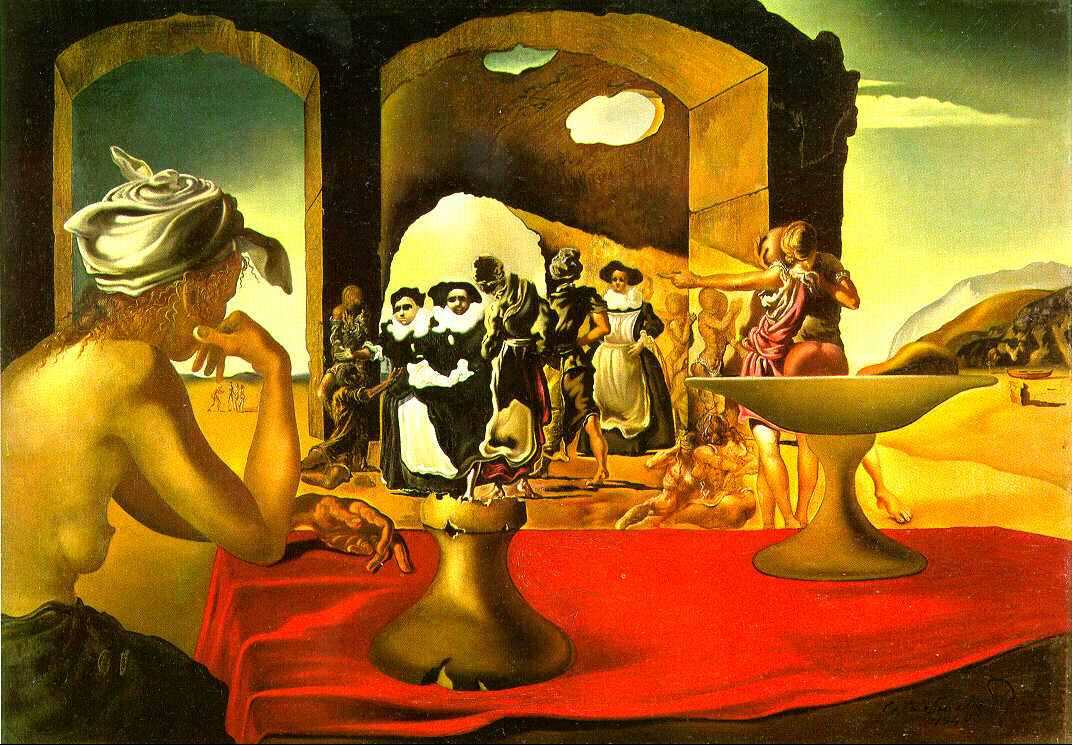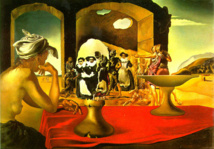The Madrid court said Monday the exhumation aimed "to get samples of his remains to determine whether he is the biological father of a woman from Girona (in northeastern Spain) who filed a claim to be recognised as the daughter of the artist."
"The DNA study of the painter's corpse is necessary due to the lack of other biological or personal remains with which to perform the comparative study," it added.
The Dali Foundation which manages the artist's estate said in a statement it would lodge an appeal against the exhumation "in the coming days," without giving further details.
- Psychic -
Dali is buried in his eponymous museum in Figueras, a city in the northeastern region of Catalonia where he died in January 1989 of heart failure after a life marked by the genius of his work and his own eccentricities and extravagances.
According to media reports Abel is 61 and a psychic.
She says her mother had an affair with Dali when she worked as a nanny for another family that vacationed in Port Lligat, a tiny fishing hamlet near Cadaques on the coast where the painter lived and worked for years with his muse Gala.
"My grandmother told me: 'I know that you're not my son's daughter, I know that your father is a great painter and she told me his name, Dali," Abel told Catalonia's TV3 television channel in 2015, adding her mother later admitted this was true.
She said she had already done DNA tests with a mask that belonged to Dali, but that she did not have the results.
Her lawyer Enrique Blanquez told AFP that the affair was "known in the village, there are people who have testified before a notary."
He said one person "worked for Dali and Dali paid her to investigate what she did and where the plaintiff's mother went."
- Relationship with Gala -
Born on May 11, 1904 in Figueras to a bourgeois family -- his father was a legal clerk -- Dali developed an interest in painting from an early age.
In 1922 he began studying at the Fine Arts Academy in Madrid, where, despite being expelled twice, he developed his first avant-garde artistic ideas in association with poet Federico Garcia Lorca and the filmmaker Luis Bunuel.
Soon he left for Paris to join the surrealist movement, giving the school his own personal twist and rocketing to fame with works such as "The Great Masturbator."
Dali also made forays into the world of surrealist filmmaking.
Returning to Catalonia after 12 years, he invited French poet Paul Eluard and his Russian wife Elena Ivanovna Diakonova to Cadaques.
It was love at first sight between Dali and the woman to whom he gave the pet name Gala.
She became his muse and remained at his side for the rest of her life.
The couple never had children and there have been testimonies that the artist was confused about his sexuality and that he was more of a voyeur than a performer where sex was concerned.
But despite the reportedly unusual relationship, Gala was still his soulmate.
When she died in 1982, he was shattered, on both a human and artistic level.
Dali himself died in 1989 in a Figueras clinic.
-------------------------------------------------------------------------------------------------------
"The DNA study of the painter's corpse is necessary due to the lack of other biological or personal remains with which to perform the comparative study," it added.
The Dali Foundation which manages the artist's estate said in a statement it would lodge an appeal against the exhumation "in the coming days," without giving further details.
- Psychic -
Dali is buried in his eponymous museum in Figueras, a city in the northeastern region of Catalonia where he died in January 1989 of heart failure after a life marked by the genius of his work and his own eccentricities and extravagances.
According to media reports Abel is 61 and a psychic.
She says her mother had an affair with Dali when she worked as a nanny for another family that vacationed in Port Lligat, a tiny fishing hamlet near Cadaques on the coast where the painter lived and worked for years with his muse Gala.
"My grandmother told me: 'I know that you're not my son's daughter, I know that your father is a great painter and she told me his name, Dali," Abel told Catalonia's TV3 television channel in 2015, adding her mother later admitted this was true.
She said she had already done DNA tests with a mask that belonged to Dali, but that she did not have the results.
Her lawyer Enrique Blanquez told AFP that the affair was "known in the village, there are people who have testified before a notary."
He said one person "worked for Dali and Dali paid her to investigate what she did and where the plaintiff's mother went."
- Relationship with Gala -
Born on May 11, 1904 in Figueras to a bourgeois family -- his father was a legal clerk -- Dali developed an interest in painting from an early age.
In 1922 he began studying at the Fine Arts Academy in Madrid, where, despite being expelled twice, he developed his first avant-garde artistic ideas in association with poet Federico Garcia Lorca and the filmmaker Luis Bunuel.
Soon he left for Paris to join the surrealist movement, giving the school his own personal twist and rocketing to fame with works such as "The Great Masturbator."
Dali also made forays into the world of surrealist filmmaking.
Returning to Catalonia after 12 years, he invited French poet Paul Eluard and his Russian wife Elena Ivanovna Diakonova to Cadaques.
It was love at first sight between Dali and the woman to whom he gave the pet name Gala.
She became his muse and remained at his side for the rest of her life.
The couple never had children and there have been testimonies that the artist was confused about his sexuality and that he was more of a voyeur than a performer where sex was concerned.
But despite the reportedly unusual relationship, Gala was still his soulmate.
When she died in 1982, he was shattered, on both a human and artistic level.
Dali himself died in 1989 in a Figueras clinic.
-------------------------------------------------------------------------------------------------------









 Home
Home Politics
Politics











